Project News
2017-03-28
Kickoff of the Project
During Phase 1 of the project, JICA supported the introduction of term contract into the road maintenance including Performance Based Contracts for Road Maintenance (PBC). Phase 1 involved: 1) the tabulation of unit and productivity rates applicable to such contracts; 2) introduction of term contracting; 3) preparation of standard Performance Based Contract (PBC) tender documents and; 4) introduction of Dynamic Response Intelligent Monitoring System (DRIMS) to evaluate road condition by International Roughness Index (IRI).
Phase 2 of the project commenced in November 2013 with the main goal of strengthening of capacity of road maintenance work with focus on PBC. Phase 2 was successfully implemented by creation of Master Trainers, development of guideline for PBC and training curriculum and so on.
Phase 3 of the Project was officially launched in December 2016. This current Phase of the project aims to disseminate all the outputs of Phase 1 and 2 to the entire Republic of Kenya and strengthen sustainability of the Project.
The overall goals in this Phase are: 1) to incorporate into the road construction industry in Kenya the Road maintenance management methodologies developed under the Project, and; 2) to ensure existing road networks are maintained and in good condition (sustainability).
The goals of this phase shall be accomplished through: 1) Enhancing Cost Estimation capacity of RAs; 2) Enhancing management capacity of RAs to maintain roads under PBC; 3) Improving Institutional capacity to conduct PBC training to public and private entities ; and, 4) ensuring that DRIMS is widely used for road condition assessment by road agencies in Kenya.
In order to achieve the project goals, a team of experts from CTI Engineering International Co., Ltd and Hanshin Expressway Company led by Eng. Nobuya Okamoto, JICA Chief Advisor form a joint implementation group with project counterparts: the Ministry of Transport, Infrastructure, Housing and Urban Development (MoTIHUD), Kenya Roads Board (KRB), Kenya National Highways Authority (KeNHA), Kenya Urban Roads Authority (KURA), Kenya Rural Road Authority (KeRRA), Kenya Wildlife Service (KWS), Kenya Institute of Housing, Building and Technology (KIHBT), Kenya Construction Authority (NCA), Public Procurement Regulatory Authority (PPRA) representing the Government of Kenya. The project team is assisted by young experienced national staff.
The 33rd National Working Group meeting to set a project work plan was held on 8 February after having initial study and discussion with counterparts. The 8th Joint Coordinating Committee (JCC) meeting, which is the top project operation committee, was held on 16 February 2017. The proposed work plan was seconded in the meeting.
The PBC implementation is facing some challenges with its expansion. The major challenges are: 1) proper training of officers from the RA; 2) Harmonization of standard tender document for PBC works with new procurement act; 3) Training of contractors; 4) Enhancing capacity by the training body, KIHBT and NCA to offer training to the contractors; and, 5) Sensitization of PBC to County Governments.
In regards to the last item, County governments in Kenya are one of the two arms of government and have a larger role in road maintenance. The Constitution assigns functions to the county governments in Kenya to perform. Such functions include County transport, which include County roads (Class D, E and Unclassified Roads), street lighting, traffic and parking, public road transport, and ferries and harbours. In 2016, Class D, E and Unclassified Roads totaling to 136,067 Km were managed by KeRRA.
In 2017, with the gazettement of the devolution of roads, approximately 127,000 km of roads which were previously under KeRRA, were transferred to the County Governments. 10% of KRB fund was allocated to the county government for road maintenance. This has necessitated the sensitization of County Governments on Performance Based Contracts for Road Maintenance works.
Table 1Road length and KRB budget allocation by road authority
| ROAD AUTHORITY | ROAD CLASS | Kms coverage by 2016 | KRB Fund Allocation(%)*1 | Kms coverage by 2017 | KRB Fund Allocation(%)*2 |
|---|---|---|---|---|---|
| KeNHA | A, B, and Superhighway | 10% | - | 10% | |
| KeRRA | C | 13,687 | 40% | 18,522 | 37% |
| KURA | A-urb, B-urb, C-urb, D-urb, E-urb, F-urb, G-urb | 130,067 | 32% | 21,415 | 29% |
| KWS | Access to National parks and circuits within the parks | 12,549 | 15% | 13,265 | 13% |
| County | D, E, F & G | 4,583 | 1% | 4,583 | 1% |
| others | - | - | - | 121,486 | 10% |
| Total | - | - | 2% | - | - |
*1 Kenya Road Act 2007
*2 Actual allocation FY 15/16
NB.urb refers to Urban
Note
- [1] The number is continuous from Phase 1
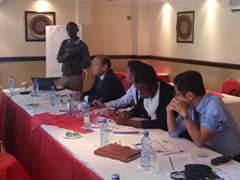 COSTES SWG meeting on 23 February 2017
COSTES SWG meeting on 23 February 2017
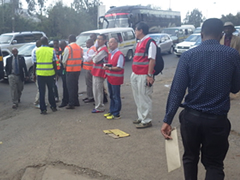 Cost sruvey practice in February 2017
Cost sruvey practice in February 2017
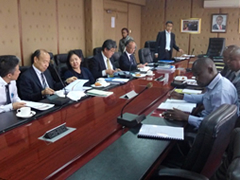 8th JCC Meeting on 16 February 2017
8th JCC Meeting on 16 February 2017
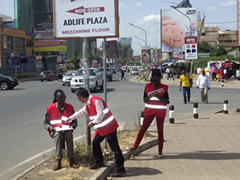 Quantity survey practices in February
Quantity survey practices in February
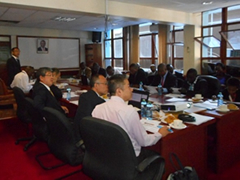 33rd National Working Group Meeting on 8 February 2017
33rd National Working Group Meeting on 8 February 2017
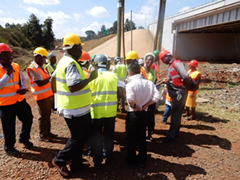 Field training of PBC inspection during KIHBT training
Field training of PBC inspection during KIHBT training
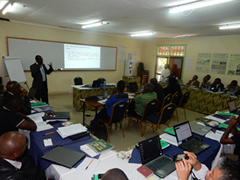 Participants during a training worshop at KIHBT, Ngong'
Participants during a training worshop at KIHBT, Ngong'
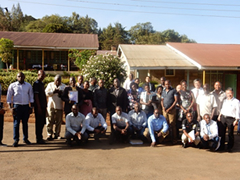 Project Team attending as observers the Training organized by KIHBT in Ngong' town
Project Team attending as observers the Training organized by KIHBT in Ngong' town
- About JICA
- News & Features
- Countries & Regions
- Our Work
- Thematic Issues
- Types of Assistance
- Partnerships with Other Development Partners
- Climate Change / Environmental and Social Considerations
- Evaluations
- Compliance and Anti-corruption
- Science and Technology Cooperation on Global Issues
- Research
- JICA Development Studies Program / JICA Chair
- Support for the Acceptance of Foreign HRs / Multicultural and Inclusive Community
- Publications
- Investor Relations
